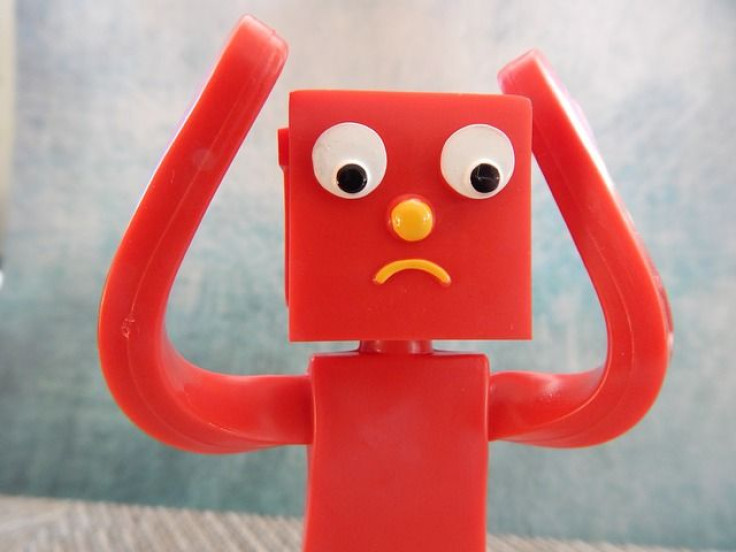7 Subtle Signs You Have An Anxiety Disorder, From Muscle Tension To Chronic Indigestion

We all feel anxious now and then. We may get nervous before taking a test or going to a job interview, but for approximately 18 percent of adults in the U.S., this uneasiness can dictate their life. People with an anxiety disorder feel worry or fear that can be constant and overwhelming, and sometimes disabling.
Nervousness can become irrational and overpowering, which constantly puts the body in a tense state. Typically, when the body senses danger, adrenaline is released, triggering the fight or flight response, designed to get us out of trouble fast. Therefore, when we're nervous, the body releases a small amount of adrenaline for us to deal with the situation. Anxiety can lead to the overload of adrenaline, which could potentially have disastrous affects on uour mental and physical health.
Read More: What Happens In The Brain When Danger Is Clear And Present
So, how can we tell the difference between nervousness and an anxiety disorder?
Below are 7 signs that may reveal an anxiety disorder.
Excessive Worry
Worrying too much about everyday things is a common trait among those with an anxiety disorder. This means the person is experiencing a continual flow of persistent anxious thoughts for weeks or months.
David Carbonell, a psychologist in Chicago, Ill., who specializes in treatment of anxiety disorders, says it's considered excessive when it's repetitive.
It's anxiety "when it focuses on hypothetical problems that don’t exist in the external world at the time, and when it disrupts one’s ability to actively take care of tasks and be involved with the world around them," Carbonell told Medical Daily.
Irrational Fears
Not all anxiety is generalized; sometimes it's attached to a specific situation or event, like taking a test, shopping, or exercising. These fears are those that stand almost no chance of actually happening. For example, the fear of driving on an icy road at night with poor visibility is realistic. Meanwhile, anxious people are fearful when there is no realistic danger in sight.
"They are often fearful of the worst-case scenario response," Dr. Paul DePompo, a clinical psychologist, researcher, and author of The Other Woman's Affair in Southern California, told Medical Daily.
Anxious people will most likely invest a lot of time avoiding this irrational fear, and exhibit other "anti-anxiety" behaviors. Healthy people will feel anxious, but not struggle against it.
Flashbacks
Obsessively thinking about a past unfortunate event is directly linked to posttraumatic stress disorder (PTSD), which overlaps with some characteristics of anxiety disorders.
"When flashbacks occur, it is your brain trying to deal with the anxiety by understanding what happened and trying to make sense of it," said DePompo.
A 2006 study in the Journal of Anxiety Disorders found some people with social anxiety have PTSD-flashbacks of experiences that are not naturally traumatic, such as being humiliated in public. Those with anxiety disorder may purposely avoid reminders of the experience, a symptom of PTSD.
DePompo suggests to look under the fear and see the logical and healthy good reasons why things happen without trying to avoid bad things all together.
"It’s important to remember if we spend our lives trying to not experience the bad things, the bad things will likely happen anyway – but it is important to remember that most of the time they won’t happen," he said.
Compulsive Behaviors
Anxious people will do what appears to a healthy person as "dysfunctional" such as repetitive checking, counting, or washing. Anxious people will engage in these behaviors to attain a sense of security, but this backfires, according to DePompo. For example, some anxious people check and recheck things to "be sure," but they check more than they have to.
Read More: ‘Safety Behaviors’ May Ease Anxiety, OCD Symptoms If Combined With Right Treatment
These symptoms are characteristic of obsessive-compulsive disorder (OCD). In this disorder,a person's obsessions and intrusive thoughts must be accompanied by compulsive behavior, whether it's mental (such as repetition), or physical (reorganizing items).
"These compulsions are generally the way they shut down the obsessive thoughts that are causing them distress (e.g. the germs on my hand are going to give me cancer...if I wash them, I won't have to worry about it)," Dr. Amanda Mulfinger, a clinical psychologist in Edina, Minn., told Medical Daily.
Muscle Tension
Muscle tension, whether it comes from flexing and releasing muscles in the body, could be linked to anxiety disorders. It's a consequence of being in a high-arousal state — when the sympathetic nervous system (SNS) is activated, according to Mulfinger. The body enters a fight or flight mode, as we subconsciously tense our muscles to be prepared and protect ourselves in a way.
“Anxiety makes the SNS misfire, causing us to be prepared for danger in situations that aren't threatening at all (e.g. a test at school),” said Mulfinger.
Chronic Indigestion
Anxiety starts in the mind and can travel throughout our body, with physical symptoms, including digestive problems. The gut is sensitive to areas of psychological stress — therefore, the physical and social discomfort of chronic indigestion can make a person feel more anxious. Indigestion is an irritating and sometimes painful anxiety symptom, according to the Mayo Clinic.
Sleep Problems
Many of us don't get enough of it, while others will struggle not to fall asleep early every night. However, if we find ourselves lying awake, worried, or disturbed about specific problems like money, or nothing at all, this could be a sign of an anxiety disorder. Those with anxiety often have trouble winding down and falling asleep, according to DePompo. “They can’t shut off that wheel of worry, thinking that if they allow their brain to wind down they will forget something and everything will crash and burn,” he said.
If you feel you could have an anxiety disorder, consult your healthcare professional.
See Also:



























